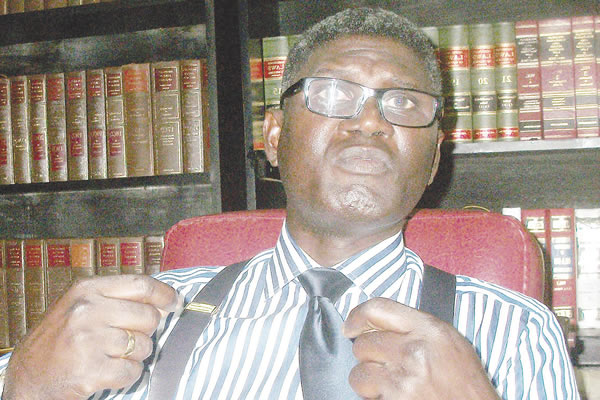Norrison Ibinabo Quakers, a Senior Advocate of Nigeria (SAN) was called to the Bar about 25 years ago. Before setting up his own law firm, he worked with Iwelumo and Iwelumo, and later joined Olisa Agbakoba and Associates. In this interview with Senior Correspondent ONYEWUCHI OJINNAKA, he speaks on stringent bail conditions, plea bargain and multiplicity of charges, among others.
What is your take on stringent bail conditions imposed by the courts?
The grant of bail is constitutional and there is a presumption of innocence on any accused person. When a court grants bail, it is part of the constitutional rights of the accused person. What is the principle for granting bail? It is to ensure that an accused person is present in court for his trial. In the event that he absconds or he is not available for his trial, the assets involved in the bail attached will be forfeited to the state. That is the principle. But some schools of thought are of the opinion that the condition attached to the grant of bail presupposes that an accused person is adjudged guilty without a hearing because the bail conditions sometimes appear to suggest that a court has taken a position and that the accused person is guilty of the alleged offence, and it is for him to establish his innocence.
There is, however, a provision that says that if an accused person feels that his bail conditions appear harsh, he could approach the court with cogent and verifiable reasons. Sometimes we compound very simple legal issues. So, if you feel that the condition is too harsh, you can go back to the court. If the court that granted the bail refuses, you can go to the Court of Appeal, and if the Court of Appeal refuses, you can proceed to the Supreme Court. We have what you can call hierarchical court structure to review condition of bail.
For instance, a man has been arraigned for stealing N500 million and you ask him to bring two sureties whose total assets will be N500 million. What you are simply saying is that the accused person stands guilty and it is for him to proof his innocence. That for me should be looked into.
Many of your colleagues accuse the Economic and Financial Crimes Commission (EFCC) of multiplicity of charges.
I would not comment on on-going criminal cases. I am one of those who believe that some of the charges by EFCC offend the rules of drafting. The beauty of our legal system is that we have rules and regulations in terms of judicial process that we file and in terms of information in a charge. We must comply with those rules. I find it shocking that we could have 50-count charge, 150-count charge, and 200-count charge. For me, it offends the rules of drafting. I think the time has come for prosecutorial agencies to get experts in legal drafting to micro-manage the case put forward to the court.
Most times, hours are wasted in reading out the counts and by the time they finished reading out the 120-count charge to the accused persons, you have already spent hours. So, aside conducting in-house training, our prosecutorial agencies must also be exposed to international best practice in criminal litigation. We cannot continue doing things the way we are doing it. I am one of those who believe that when a case is very clear, there is no point wasting precious judicial time, an accused person could enter into plea bargain.
How would you react to the suggestion that plea bargain is like giving a criminal a slap on the wrist?
It is because we have not done it well. You do not strike a deal that will make people feel that the accused has kept his loot. There is something called interim forfeiture of assets. So, what is expected of an anti-corruption agency is to investigate and discover the assets before the criminal case is instituted. Without his knowledge, you approach the court ex-parte and get a freezing order to stop the accused person from having access to those funds to fight back. I like to commend the EFCC because, to that extent, they are working.
For me, plea bargain is not a slap on the wrist. Because Nigeria is a country where we sometimes abuse certain privileges and take advantage of loopholes in our laws, some do not believe in plea bargain. Why do you plea bargain? It is because you want to avoid the rigour of trial. How many former governors have been convicted from 1999 till date? It is only one. Rather we have trials that have been lingering. Are we saying we do not know what to do?
Suggest ways the criminal justice system can be strengthened?
First, you cannot strengthen the criminal system without the reinforcement of the institutions. President Barack Obama said the challenge with Africa is that our institutions are not strong. . I like that. It is like a situation where institutions are built around human beings. And when a particular head of such institution is no longer there, it will nose-dive. EFCC under Nuhu Ribadu was quite effective; but when he left, EFCC began to nose-dive. The institution became another story entirely.
When the institutions are reformed, the laws become effective. In America, it is not about the man heading the institution, people may not know you, but the point is there is more emphasis on the institution itself. What I am saying is that the laws are there, all we need is to strengthen the institutions.
Can you assess the Administration of Criminal Justice Act (ACJA), a year after it became operative?
Incidentally, I was in the committee that worked on the ACJA. It was passed into law to address challenges in criminal litigation. Have we fared well since the law was passed? I would not say no, because we have tried to the best of our ability. Our major challenge has always been our attitude, the law can only work when people have positive disposition towards it. A law can only be effective when we believe in it; when we apply ourselves to it. Our attitude towards the efficacy of law is what has made the law to appear ineffective and inefficient. For example, if the law says, once criminal trial commences, it must be heard day to day, as defence counsel, I am enjoined to co-operate with the prosecution in ensuring that the matter is determined day to day. Assuming one day I leave for court and I am held up in traffic. I am unable to get to court for the matter to be heard and the matter is adjourned. Can you attribute that to a deliberate attempt to delay? Assuming the judge on the day fixed for hearing of the case suddenly gets a call that he has to be in Abuja and I get to the court only to be told that the court is not sitting.
Again, if a charge is defective, why must I go through the whole gamut of trial? Those are the issues. We must not be seen to unnecessarily apportion blames. Criminal trial is serious work. I remember one of our judges that said “it is better for 10 people to walk away free than for an innocent man to be convicted”. So, we need an all stakeholders’ meeting. We must all believe in the Administration of Criminal Justice Law. If we are driven by the mindset that foreigners must have trust in our justice system, we will work together. Take a look at the Civil Procedure Rules, whose primary objective is to ensure that things work smoothly. But how many trials have we had or completed in record time? If we do it well, no trial should exceed one year.
Some lawyers have faulted the ACJA because it states that court must not stay proceedings in criminal matter. But, what if the jurisdiction of the trial court is challenged?
The new law says the court will not stay proceedings. There are settled principles of law in relation to jurisdiction of the court. It is trite that once an appeal has been entered, the lower court’s power to proceed is frozen. Reason: the lower court is expected to defer to the higher court. So, if you stay proceedings, it is to await the outcome of the matter at the Court of Appeal. So, the trial court is expected to stop. So, you do not go on appeal for the purpose of stalling the trial at the lower court.
Criminal trial enjoys speed, even at the appeal level. So, a lawyer must show industry for the court to hear the matter once and for all. In a jurisdictional issue, the Supreme Court has said in plethora of cases that a man must not be subjected to the rigour of criminal trial when you do not have jurisdiction to entertain the case. Because, if at the end of the day, it is found that you did not have jurisdiction, you have wasted precious resources and time. For instance, if a case of copyright is filed against a person at the state high court and the defendant filed a preliminary objection challenging the jurisdiction of the court to hear the matter, but the court says no, under the administration of criminal justice law, the matter must be heard day to day. The accused person has the constitutional right to go on appeal over that decision. Once you get the nod of the court, you compile your records.













